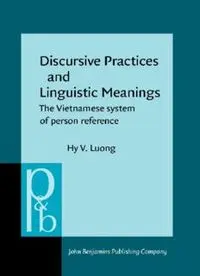
Discursive Practices and Linguistic Meanings: The Vietnamese System of Person Reference PDF
Preview Discursive Practices and Linguistic Meanings: The Vietnamese System of Person Reference
DISCURSIVE PRACTICES AND LINGUISTIC MEANINGS Pragmatics & Beyond New Series Editors: Jacob L. Mey (Odense University) Herman Parret (Belgian National Science Foundation, Universities of Louvain and Antwerp) Jef Verschueren (Belgian National Science Foundation, University of Antwerp) Editorial Address: Linguistics (GER) University of Antwerp (UIA) Universiteitsplein 1 B-2610 Wilrijk Belgium Editorial Board: Norbert Dittmar (Free University of Berlin) Bruce Fraser (Boston University) John Heritage (University of California at Los Angeles) David Holdcroft (University of Leeds) Catherine Kerbrat-Orecchioni (University of Lyon 2) Beatriz Lavandera (University of Buenos Aires) Marina Sbisà (University of Trieste) Emanuel A. Schegloff (University of California at Los Angeles) Paul O. Takahara (Kobe University) Sandra Thompson (University of California at Santa Barbara) Daniel Vanderveken (University of Quebec at Trois-Rivières) Teun A. van Dijk (University of Amsterdam) 11 V. Luong Discursive Practices and Linguistic Meanings The Vietnamese System of Person Reference DISCURSIVE PRACTICES AND LINGUISTIC MEANINGS THE VIETNAMESE SYSTEM OF PERSON REFERENCE V. Luong University of Toronto JOHN BENJAMINS PUBLISHING COMPANY AMSTERDAM/PHILADELPHIA 1990 Library of Congress Cataloging-in-Publication Data Luong, V. Discursive practices and linguistic meanings : the Vietnamese system of person refer ence / V. Luong. p. cm. - (Pragmatics & beyond, ISSN 0922-842X ; new ser. 11) Includes bibliographical references. 1. Vietnamese language - Usage. 2. Vietnamese language -- Address, Forms of. 3. Vie tnamese language -- Noun. I. Title. II. Series. PL4373.L8 1990 495'.925 - dc20 90-3171 ISBN 90 272 5021 9 (Eur.)/l-55619-277-0 (US) (alk. paper) © Copyright 1990 - John Benjamins B.V. No part of this book may be reproduced in any form, by print, photoprint, microfilm, or any other means, without written permission from the publisher. CONTENTS Acknowledgements vi 1. LANGUAGE, REPRESENTATION, AND CHOICE 1 1.1. The Vietnamese System of Person Reference 9 1.2. Representation and Choice: A Theoretical Overview 20 2. "BROTHER" AND "UNCLE" 37 2.1. Kinship Terms and the Native Sociocultural Universe 40 2.2. The Ho 49 2.3. Vietnamese Kin Terms: Meanings and Structural Op positions betwen Native Models 69 3. VIETNAMESE PROPER NOUNS: STRUCTURE, PRACTICE, AND POLITICS 83 3.1. Vietnamese Names: Structural Relations and History 84 3.2. The Meaning and Use of Proper Nouns 1 4. PERSONAL PRONOUNS 123 4.1. Contexts and Meanings 124 4.2. Linguistic Usages and Structural Oppositions: Personal Pronouns and Beyond 128 5. NATIVE MODELS, STRUCTURAL OPPOSITIONS, AND DISCUR SIVE PRACTICES 149 5.1. Pragmatic Presuposition, Meaning, and Use 149 5.2. Structural Oppositions, Discursive Practices, and Linguistic Meanings: A Concluding Statement APPENDICES 1. Genealogical Referents and Referential Perspectives Vietnamese Kin Term Usages 2. Equivalence Rules for the Genealogical Extension Vietnamese Kinship Terminology 3. Logical Relations and Rules of Linguistic Usages 4. Status Terms in the Nguyên-Phuc Patriline NOTES REFERENCES To HÔng-Tâm, Tuyet, and my parents. ACKNOWLEDGEMENTS I have benefited from the comments of many scholars in the revision of the earlier versions of this book. Roger Brown, John Pelzel, Steven Caton, Stanley Tambiah, Linda Pliskin, and an anonymous referee for John Benjamins have made extensive substantive and editorial comments on the manuscript. They have contributed to the refinement of my analysis and the clarity of my arguments. The original field study in California was funded by the Council on East Asian Study at Harvard University. The field data from Vietnam are from a complementary research project in Summer 1987. It was assisted by a grant from the Social Science Research Council and the American Council of Learned Societies with funds provided by the National Endowment for the Humanities and the Ford Foundation. To all these sources of financial assis tance and intellectual support, I am forever grateful. 1. REPRESENTATION, CHOICE, AND LANGUAGE: AN INTRODUCTION Tsze-loo said, "The prince of Wei has been waiting for you, in order with you to administer the government. What will you consider the first thing to be done?" The Master [Confucius] replied, "What is necessary is to rectify names If names be not correct, language is not in accordance with the order of things. If language be not in accordance with the order of things, affairs cannot be carried on to success Therefore a superior man considers it necessary that the names he uses may be spoken appropriately.... (Con fucian Analects, Book ΧΙΠ, Ch. III) The duke King, of Ts'e, asked Confucius about government. Confucius replied, "There is government, when the prince is prince [behaving like a prince], and the minister is minister [behaving like a minister]; when the father is father [behaving like a father], and the son is son [behaving like a son]." (Confucian Analects, Book XII, Ch. XI) The common issue to classical social theorists and contemporary linguists alike is the dynamics of human action and linguistic performance. The diverse approaches to the problem pivot upon a basic polarity in Western thought—hu man action either as representation of a supra-individual, monolithic, and self-regulating order, or as goal-directed behavior of self-interested, manipula tive, and unique individuals. Minor variations notwithstanding, in contemporary social and anthropological theory, it is the difference between Durkheim's and Spencer's frameworks, between Lévi-Strauss's and Malinowski's theories. In the literature on language, this contrast is nicely summarized by Saussure who works within the Durkheimian framework. To Saussure, it is the difference between langue as a homogeneous entity of abstract linguistic forms which exists independently of human action, and parole as a heterogeneous mass of speech utterances which vary freely with the "will" of individual actors (1959:
